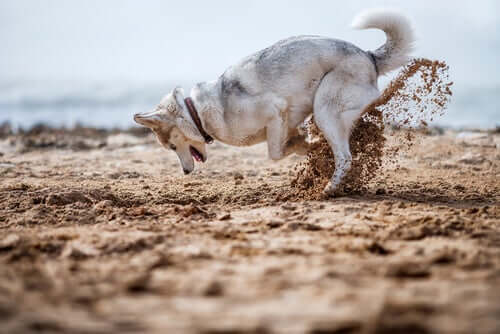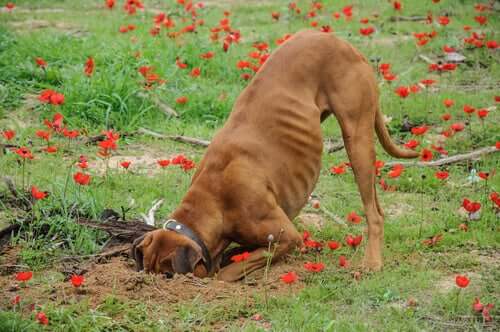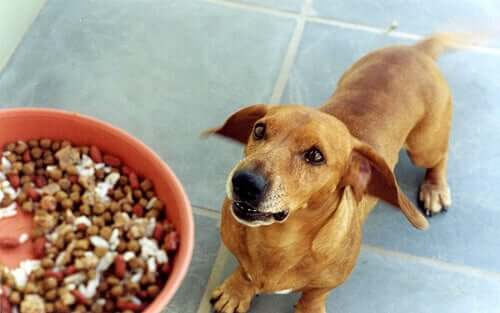What Should You Do If Your Dog Hides Its Food?

The sense of survival inherited from their wolf ancestors is the main reason why your dog hides its food. They may do it in the garden or inside the house (as in the dirt of your house plants or below their mattress or your pillow). Have you ever wondered why?
Well, today we’re not only going to tell you why. We’re also going to give you some advice on how to handle it.
So, why does your dog hide its food? To get to the root of any problem you must always start at the beginning. So, let’s go there.
Why your dog hides its food
We’ve mentioned (on several occasions) how dogs evolved from wolves. They were wild animals with a strong instinct for survival before they became man’s best friends.
You already know about the survival of the fittest, the precept that says that only the strongest survive in the wilderness. Well, having stored food was a guarantee that a dog would have a meal to eat later. Whereas if they ate everything, they would be defenseless and depleted of their energy.
It also explains why animals eat so fast. They must do so in order to prevent other predators from stealing their prey.
However, why hide the bones if they want a food reserve? Bones don’t offer much in terms of nutrition. So it doesn’t make a lot of sense, right?
Well, scientists discovered that in ancient times the little meat that remained in those bones, as well as their marrow, was good enough during times of scarcity. It kept them going until they found something else to eat.
Why do it at home if there’s plenty of food there?

Of course, you might think that all this is great. However, your pet doesn’t lack food and doesn’t need to save it for later because you’ll give them more whenever they need it. However, the fact of the matter is that their instincts overrule their species’ new lifestyle.
Just so it’s clear, one could say that hiding food is deeply ingrained in canines. A sort of tradition that’s difficult to uproot. Sort of like eating turkey for Thanksgiving dinner is for you and the rest of Americans. However, there are several reasons why your dog hides its food:
- It may be you’re not giving them the right amount. They think it’s too little and must save it for when they’re truly hungry.
- If there’s more than one dog at home, one of them may fear there’s not enough for both of them to eat.
- You have a cool pot or garden, and it’s so much fun to dig holes and hide food there.
- If you feed them something new, they may want to save it as a treat for a special occasion.
- To plan for the future in case something happens. This concern can be much more intense in dogs that were once abandoned. Of course, they’re afraid their owners won’t return. They must cover their backs.
In general, you should know the practice of hiding food is rather common in many animal species (including humans). We hide our food for later, especially if we foresee an extremely cold winter.
What should you if your dog hides its food?

When dogs hide food, they’ll remember it and eat it when they’re hungry. Unfortunately for your sensitive nose, they may also forget about it and it will stay there until it rots. So, what you can do to avoid this scenario?
- Keep a tight feeding schedule and stick to it. Maintaining a routine will help lower the dog’s anxiety. Consequently, they won’t feel they have to hide their food for later.
- If you feed them something new, look at what they do with it. Watch and see where they take it. It’ll help you in the near future.
- Talk to your vet and find out the exact amount of food you should be feeding your animal according to their size, weight, and age.
- Don’t give them more food than they need. On the same note, don’t give them less.
- Stay close to them while they eat. Especially if you’re new friends. This will give them the certainty that you’ll never abandon them.
If your dog hides its food, just laugh it off and take it out of your pillow. Rest assured that it’s normal behavior, more or less. Try to do your part to help them feel safe. Reassure them, and make them feel there’s no reason to feel anxious.